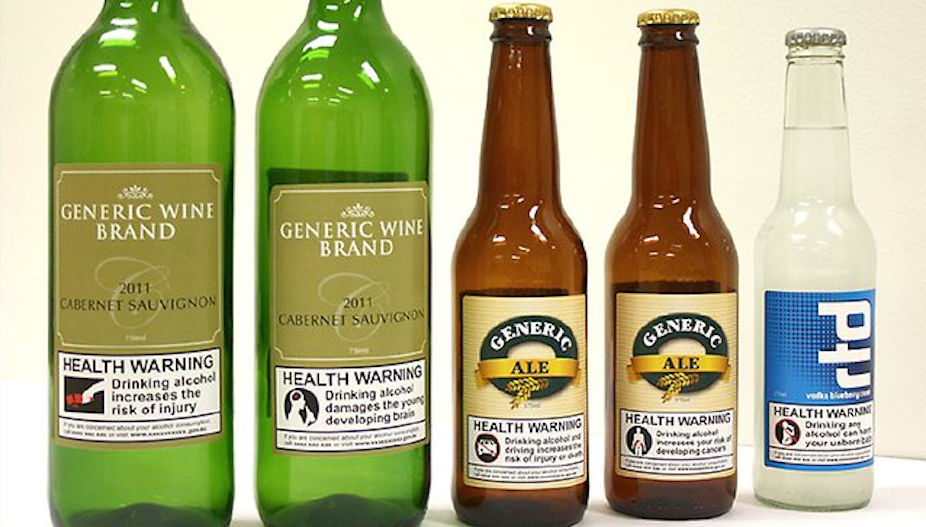A claim by Australia’s peak wine body that warning labels on bottles could prompt pregnant women to seek terminations is an “outrageous attempt to put commercial interests ahead of public health”, a drugs and alcohol expert said.
The Winemakers’ Federation made the suggestion in a submission to a parliamentary inquiry into Fetal Alcohol Spectrum Disorder. The submission warns there is a “great risk” for women whose only understanding of the risks to the unborn baby came from labels.
In Australia, it is not a requirement that alcohol carry health warning labels, although there has been a concerted push in recent years to change that.
A poll by the Foundation for Alcohol Research and Education found that 61% of Australians support alcohol warning labels.
But in its submission, the Federation warns that women who discover they are pregnant will “immediately review their alcohol consumption in the previous one to two months … Some expectant mothers may be so concerned or in such a state of depression and guilt as to terminate the pregnancy based on their expectation that the fetus has been damaged.”
Michael Livingston, a Research Fellow at Turning Point Alcohol and Drug Centre and Doctoral Student at University of Melbourne, said the Federation was “more or less advocating not warning pregnant women about any possible health risks. Withholding information is their advice. They’re pretending to be worried about the health of women, basically, which is fairly outrageous and disingenuous.”
However, Stephen Strachan, Chief Executive of the Federation, said that to use two paragraphs from the submission to characterise the “detailed, well-referenced, 21-page document in which we present for consideration a broad range of research around the issue of [Fetal Alcohol Spectrum Disorder] and alcohol consumption in general” was “so misleading it is more of a fabrication than a conversation”.
“Two paragraphs in one subsection refer to the issue of whether pregnancy warning labels can affect decisions by expectant mothers.
"This is not something [we] made up. It reflects concerns and evidence presented by such sources as the Royal Australian College of Obstetricians and Gynaecologists, the National Health and Medical Research Council, the Ministerial Council on Drug Strategy, and researchers published in the British Medical Journal and by the Public Health Agency in Canada.
"As we state in the submission, ‘WFA supports the current [National Health and Medical Research Council] advice that if women are pregnant, breastfeeding or intending to conceive, then not drinking is the safest option.’ We also openly encourage winemakers to voluntarily use the "pregnant woman” logo and are working with government to improve the roll-out of this and other consumer information messages.“
Mr Strachan said the Federation rejected the constant calls for cigarette-style warnings on alcohol products "when all the evidence suggests they don’t work. Both the World Health Organisation and leading anti-alcohol researchers in Australia commissioned by the Food Standards Authority have shown that warning labels don’t change behaviour.
"I know this next statement will bring howls of derision from our critics, but winemakers do care about [Fetal Alcohol Spectrum Disorder] and the other consequences of inappropriate alcohol use, and regularly commit to support genuine, evidence-based initiatives that will attempt to address the social problem of alcohol abuse.”
Mr Livingston said there was strong evidence that Australians were not well-informed about the health risks of drinking. “So any means we have of increasing awareness is a positive step, and labels are obviously one component of that.
"There’s evidence largely from the tobacco field but a small amount also from overseas in the alcohol field that labels can impact on people’s attitudes and behaviours,” he said. “They’re a fairly low-cost, unobtrusive health promotion tool that has the potential to reduce harm in our community.”
Greens’ health spokesperson, Richard Di Natale, said the submission by the Winemakers’ Federation was insensitive.
“Are they suggesting that health professionals should not advise pregnant women that alcohol may harm their baby because it may lead to a termination?” Senator Di Natale said. “Or that pregnancy warnings should be removed from cigarette packets?
"Providing factual information about the health consequences of alcohol, or any product with the potential for harm, is an important step towards behaviour change.”

